Thanks to decades of work by Black activists and leaders, the #BlackLivesMatter revolution and fight for Black liberation has finally reached the tipping point. Whereas before, we were conditioned by White society not to talk about race or racism, today we have no option but to engage (hopefully in meaningful ways).
As Angela Davis, the political activist, author, and educator once said, “In a racist society, it is not enough to be non-racist, we must be anti-racist.”
Part of being anti-racist means showing up as an ally, a journey in itself that’s lifelong and involves constant learning and unlearning.
I didn’t realize it at the time, but my own (un)learning journey began in 2015, the year we founded Cambio & Co. The more I began to dive into Filipino history in Canada, the USA, and the Philippines, the more I learned how deeply rooted White supremacy and anti-Blackness was in our community and in my own mind.
Along the way, I’ve been able to learn a lot about allyship and solidarity (many of those lessons delivered through awful missteps and painful, but deserved, call outs). And so I wanted to share some of the things I’ve learned with you, particularly my Filipinx fam.
I’ll say it now though: the lessons I’m about to share are by no means exhaustive. They're not things I do perfectly, but things I strive to do and ways I strive to be. I hope you find them helpful in your own anti-racism journey.
Here’s a starting point in how to be an ally to the Black community.
1. Engage *Especially* When It’s Hard.
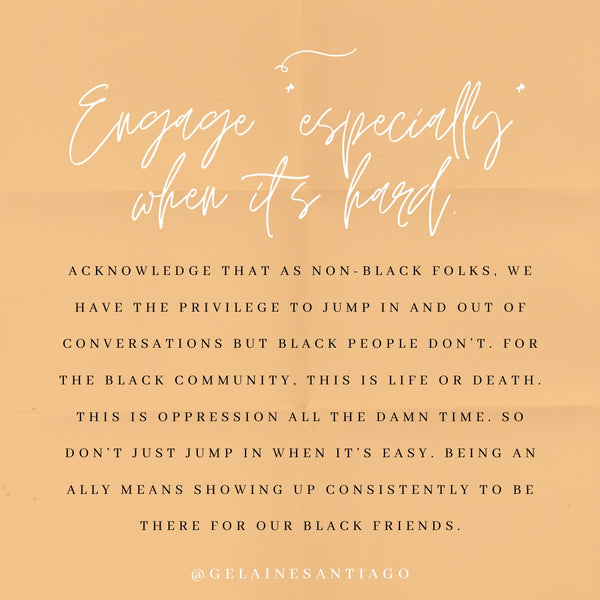
Acknowledge that as non-Black folks, we have the privilege to jump in and out of conversations about racism, police brutality, and anti-Blackness, but Black people don’t. For the Black community, this is a lived reality and a danger they face every single day.
Yes, we non-Black folks may be tired and busy and overwhelmed because we’ve got a lot going on. Yes, we may be called out as a nuisance or a troublemaker. Yes, speaking up may be uncomfortable and scary.
But being an ally means showing up consistently and being there *especially* when it’s difficult; not just when it’s easy, convenient, or trendy.
2. Listen To Black Folks When They Share Their Experiences.
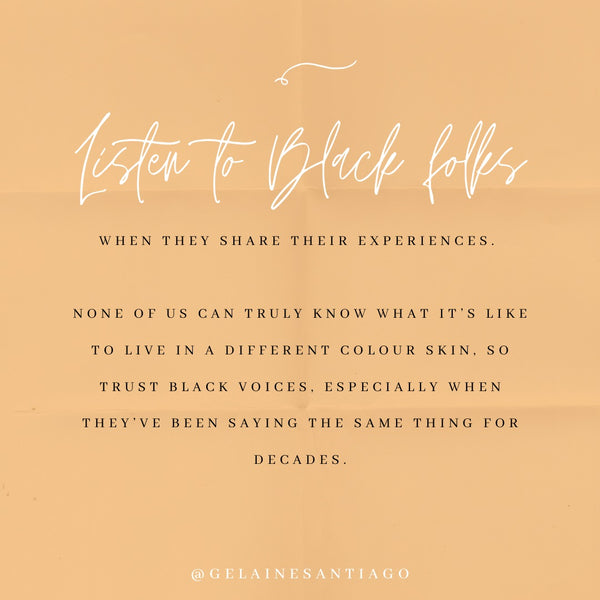
Just because you haven’t personally experienced something doesn’t mean it’s not real.
It’s human nature to think the world revolves around us, but it doesn’t. Part of being an ally means believing the experiences and voices of Black folks, particularly when those voices have been saying the same thing for YEARS.
If a Black, Indigenous, or person of colour calls you out for something, then please take the time to listen and fight the instinct to dismiss them. For Black folks, their lived experience makes them an expert, so listen to them.
3. But Don’t Rely On Black Folks To Explain Things To You.
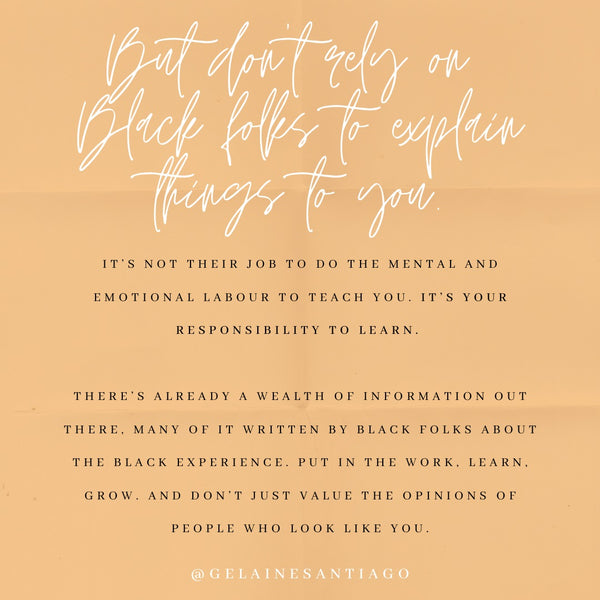
If a Black person chooses to educate you, then please sit down and listen. Otherwise, do NOT expect them to do the work for you.
Don’t ask them to send you links to articles. Don’t ask them about their own experiences with the police. Don’t ask them to get on a call to explain things further or to clear up any ‘misunderstandings.’
Most of the time, these misunderstandings are often the result of us, non-Black folk, not putting in the work, time, or energy to learn what we need to learn.
There’s already a wealth of information out there, the majority of it by Black activists, creators, and educators. They’ve taken on the mental and emotional labour to educate us about the Black experience and Google is free.
If you’re struggling with where to begin, check out this guide called Filipinx For #BlackLivesMatter with resources specifically for the Filipinx community. You should also head to Rachel Cargle and Austin Channing Brown, two Black women and anti-Black racism educators.
4. Speak Up & Educate, So Our Black Friends Don’t Need To.
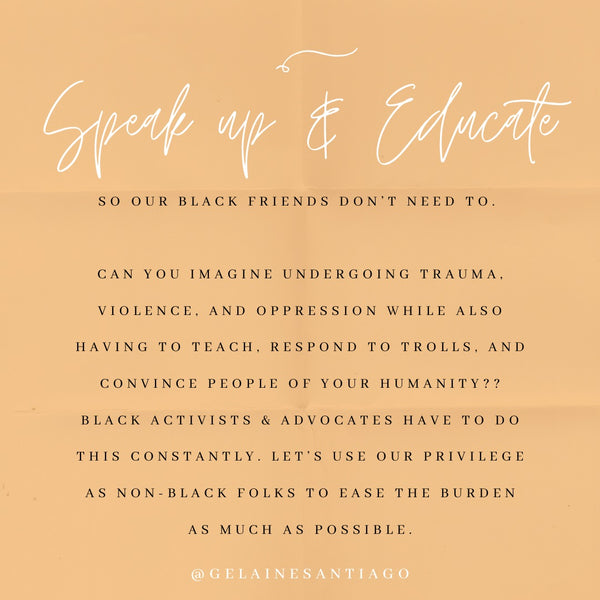
Let’s use our privilege as non-Black folks to ease the burden as much as possible. The more non-Black people speak up against anti-Blackness, the less time, labour and energy Black people need to spend advocating for themselves.
This is particularly true if you’re a White person, as anti-Black racism still impacts communities of colour, though of course to a lesser degree than Black folks.
If you’re concerned about taking up space by speaking out, ask yourself, “Does my speaking out benefit the Black community? Or does it benefit me?” It’s only taking up space if you’re pushing your own agenda; not if you’re amplifying messages that the Black community is asking us to share.
When we stay silent, we are part of the problem. When we witness injustice and choose to speak up, we become part of the solution (credit Dave Chappelle).
5. Do Not Say “Not All White People” + Insert Personal Hardship Here.
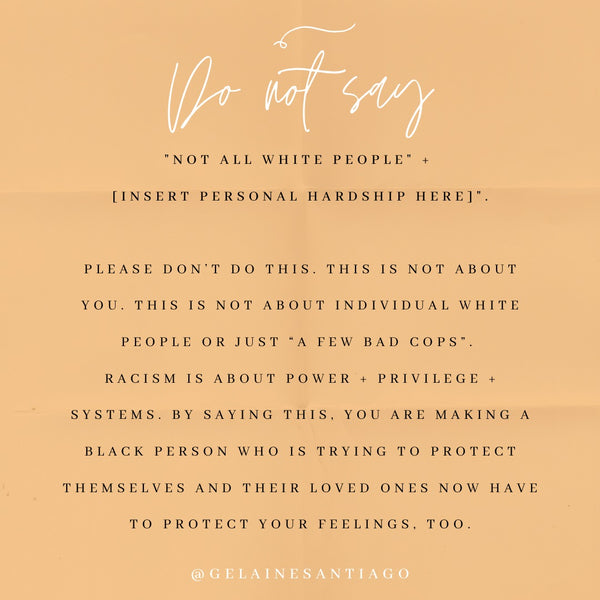
Actually, it’s best to never say anything like this, ever.
A key step to allyship is acknowledging that none of this is about you, your friends, or your family members.
Racism is about power + privilege + SYSTEMS. This isn’t about you as an individual or about a few “bad cops.” Racism is about systems, structures, and power dynamics which have the effect of actively oppressing a group of people.
By saying this, you’re making a Black person who is trying to protect themselves and their loved ones now have to protect your feelings, too.
6. You Can Be The Target Of Racism & Still Contribute To And Benefit From Racism.
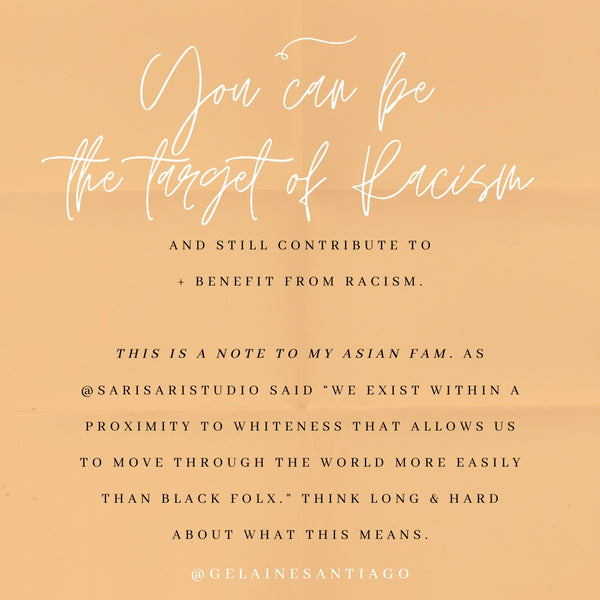
This is a note to the Filipino community and my fellow Asians.
Yes, anti-Asian racism is real, alive, and well. However, we must acknowledge that the racism we’ve experienced is nowhere near the level of brutality and violence that have been inflicted upon our Black siblings.
As Asians, we benefit from the model minority myth. White supremacy has classified certain groups (Asians) as “the good ones” who are hard working and submissive and desirable. We then try to live up to that myth because it brings us closer to the good opinions of those in power (White folk).
Asians live in a proximity to Whiteness that has made it easier for us to be accepted. Again, there’s no denying that we’ve faced racism and discrimination as a group, but we’ve never been classified as dangerous or threatening to the point that we fear for our lives while jogging in the middle of the day.
Our fates are intertwined. None of us are free until all of us are free.
7. Don’t Expect Gratitude.
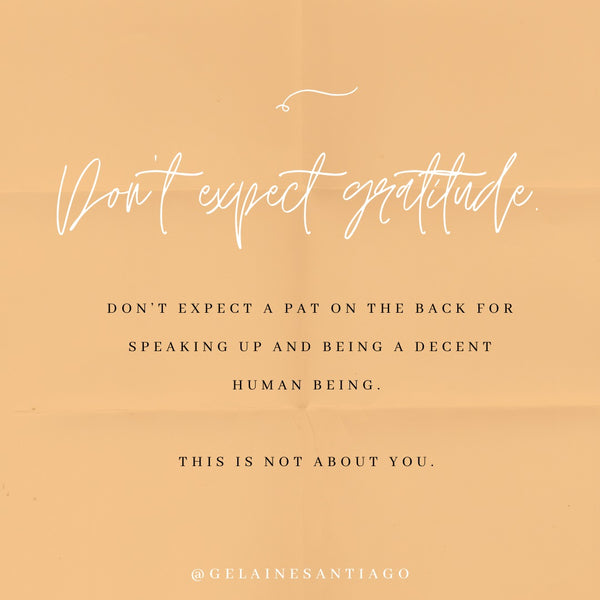
True allyship is about centering the voices and stories of the community you’re aiming to uplift. It should never be about you.
If you’re attending a protest in support of Black Lives Matter, allow the Black folks to lead the conversation, the cheers, and the motions. You should not be the loudest one in the room.
‘Ally’ isn’t a title you can give yourself. Instead, it’s up to the community you’re supporting to decide whether your actions have lived up to their definitions. Are you backing your words by action? Are you doing what the community has asked you to do, and supporting them in the ways they’ve asked to be supported?
As Robin Deangelo, the author of White Fragility and a White person said in an interview, “I don’t call myself a white ally… And that’s because that is for people of color to decide, whether in any given moment I’m behaving in anti-racist ways. And notice that that keeps me accountable. It’s for them to determine if in any given moment—it’s not a fixed location—I haven’t made it or arrived. …”
8. Listen To Feedback When You Mess Up (And You *Will* Mess Up)
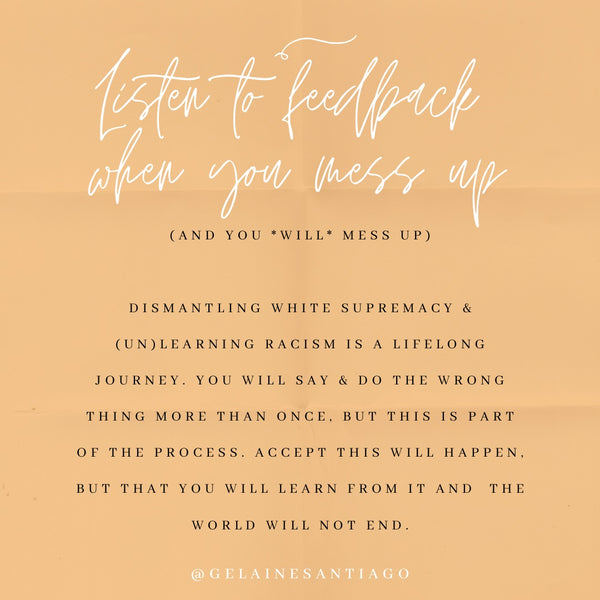
Allyship is a lifelong practice. It’s a learning journey; one that’s bound to be messy and painful (because we will all mess up at some point, multiple times).
But it’s also a journey that’s critical, not for our own growth, but to build the kind of world that we, as Black, Indigenous, and People of Colour - all of us - deserve.
What have you learned about allyship and solidarity? Share your lessons below.
Gelaine Santiago
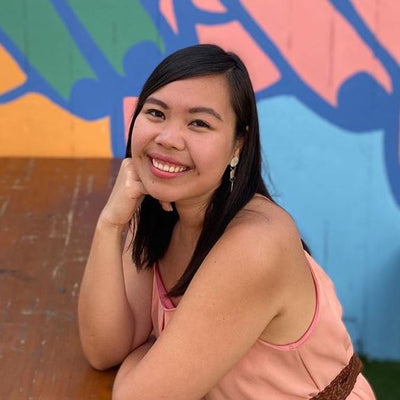
Gelaine is a social entrepreneur, an online storyteller, and a passionate advocate for diversity and ethics in business. She’s the co-founder of Cambio & Co., an e-commerce fashion company working with Filipino artisans to celebrate Filipino craftsmanship, culture, and heritage. Gelaine is also one of the founders of Sinta & Co., the world’s first conscious Filipino wedding boutique. She was named one of RBC’s Top 25 Canadian Immigrants of 2019. Find her on Instagram @gelainesantiago and www.gelainesantiago.com



Leave a comment